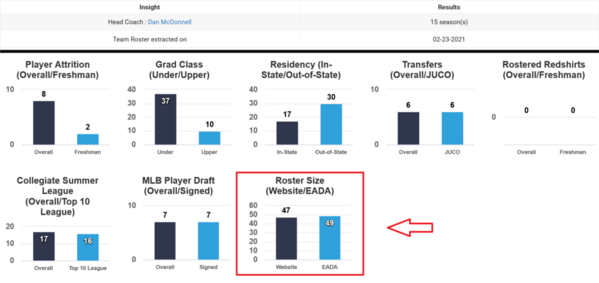KISS Method, been collecting roster data since 2015, have data going back to 2011, just don't make it available, its just like researching US Census records, a lot of Swiss cheese
The question will be what is your objective:
Fall - let me see who came back or how many players are trying out. website may or may not have current year commits listed. I would compare Fall Season to MLB Spring Training Roster.
Do I really care? IMHO no different that trying out for a high level travel program , just dealing with a greater financial commitment
For example, last fall here is the split of how many schools provided fall rosters.
NCAA-D1 - 233/301
NCAA-D2 - 135/255
NCAA-D3 - 105/387
NAIA - 124/199
JUCO are very inconsistent
Assume a team brings in 40 to 50 percent over normal roster size. Watch out for development or JV teams.
Spring - Normally a couple of days before the start of their season. This can depend on the region.
CCCAA - Jan 31
NCAA-D1 - Feb 15 (whenever season starts)
NCAA-D2, D3 - Based on region, south (early feb), Northeast/midwest (March)
NJCAA - Same as NCAA-D2, D3
NAIA - Beginning of feb
NWAC - Mar
NCCAA/USCAA - normally follow D3 schedule
Note, roster may or may not change in-season, note we've notice schools deleting players from their rosters when they declare themselves to the transfer portal, thus they disappear from website with the exception of their stats.
From a CBI perspective the only value the fall roster holds is tracking 1st year players that wind up dropping down to a JUCO, normally the JUCO does not record if they've dropped down, and using a commitment database, e.g PG, PBR, Five tools, etc is too speculative.
Due to the level of gray space, we focus on comparing Website vs EADA. EADA must be reported to dept of Ed. for financial aid compliance.
You've seen the following from CBI in a couple of post.
- Participants
- Students who, as of the day of a varsity team's first scheduled contest (A) Are listed by the institution on the varsity team's roster; (B) Receive athletically related student aid; or (C) Practice with the varsity team and receive coaching from one or more varsity coaches. A student who satisfies one or more of these criteria is a participant, including a student on a team the institution designates or defines as junior varsity, freshman, or novice, or a student withheld from competition to preserve eligibility (i.e., a redshirt), or for academic, medical, or other reasons. This includes fifth-year team members who have already received a bachelor's degree.

Overall, IMHO fall rosters provide a projection of what the roster will look like in the spring. Note, there will be some changes between fall and spring, e.g. late joiners, but you can get this information on the spring rosters.


